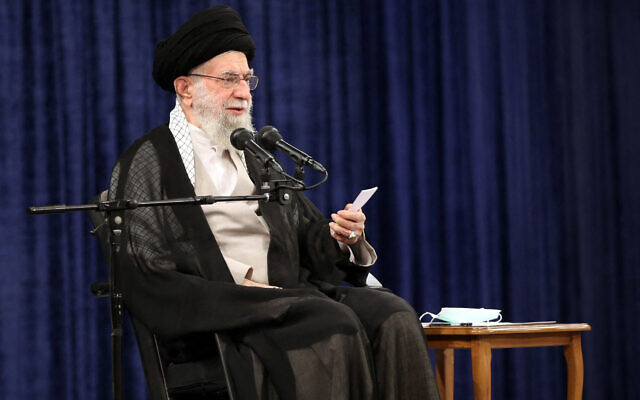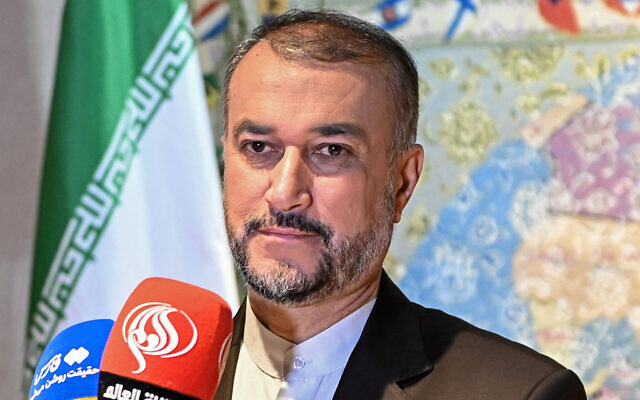Washington has “always” indicated to Tehran that it would be “open to diplomacy” over the country’s contentious nuclear program but that Tehran must first take “de-escalatory steps” to reduce high tensions and “create a space for diplomacy,” a US State Department spokesperson said Tuesday.
Matthew Miller said in a press briefing that the US was “committed to ensuring that Iran does not obtain a nuclear weapon, and we would prefer to address our concerns about Iran’s nuclear program through diplomacy.”
The comment was in response to a question about a recent report that Japan has proposed an initiative to resume talks to revive the 2015 nuclear deal. Iranian Foreign Minister Hossein Amir-Abdollahian said earlier Tuesday that a Japanese initiative that would align with “Iran’s interests” would be welcome by Tehran and praised the “constructive role of Japan in reviving the nuclear deal,” according to Arab News which cited Japanese news agency Kyodo News.
Amir-Abdollahian told Kyodo News that he received the Japanese proposal while on a visit last month to Tokyo to meet with Prime Minister Fumio Kishida and then-Foreign Minister Yoshimasa Hayashi.
Miller said Tuesday he was “not aware of that specific initiative” but that Washington believes “diplomacy is the best way to ensure that Iran never obtains a nuclear weapon.”
“We have always said that we are open to diplomacy with Iran. I don’t want to get into what any such talks might or might not look like, but diplomacy, we believe, is the best path to preventing Iran from obtaining a nuclear weapon. We would prefer to pursue diplomacy,” Miller said Tuesday , adding that there were “a number of de-escalatory steps that we want Iran to take.”
Iran sparked widespread concern earlier this month after removing a third of the International Atomic Energy Agency’s most experienced inspectors from accessing nuclear facilities in the country, a move that was blasted by the IAEA’s chief as unprecedented.
Iranian Foreign Minister Hossein Amir-Abdollahian (R) welcomes International Atomic Energy Agency (IAEA) chief Rafael Grossi ahead of a meeting in Tehran on March 4, 2023. (ATTA KENARE / AFP)
US Secretary of State Antony Blinken said Friday that Iran’s nuclear program was a “destabilizing element” and accused Tehran of not being “interested in actually being a responsible actor” after booting the UN inspectors.
Miller said Iran must take de-escalatory steps “if it wants to reduce tensions and create a space for diplomacy,” and that Washington has “not yet seen indications” that Iran is “serious about addressing the concerns” the US and other countries party to the 2015 agreement have about its nuclear program.
Earlier this month, the US, Britain, France and Germany told the IAEA that Iran must clarify questions over its nuclear program, including concerns over the monitoring cameras, and the presence of uranium particles enriched to near weapons-grade level.
“If Iran really is serious about taking de-escalatory steps, the first thing it could do would be to cooperate with the IAEA. We have not seen them fully do that,” Miller said.
Miller clarified that he was “not saying” that the US would only resume direct or indirect talks with Iran if these de-escalatory steps are taken.
A separate new report on Tuesday claimed that Iran’s top leader has given the go-ahead for direct talks with the US over its nuclear program, a move that came days after Washington said it blocked Amir-Abdollahian from visiting.
According to the UK-based Amwaj.media, Iran wants to resuscitate negotiations over bringing the US back into the 2015 deal where they were when they fell apart about a year ago.
Those talks, which were conducted via the European Union, collapsed after both sides indicated it was nearly a done deal.

A handout picture provided by the office of Iran’s Supreme Leader Ayatollah Ali Khamenei shows him speaking before students and clerics during a rally in Tehran on July 12, 2023. (Photo by KHAMENEI.IR / AFP)
Publicly, the US has expressed little interest in returning to the table. But it has repeatedly touted diplomacy as its preferred option for stopping Iran from nuclear weapons capabilities, and recently negotiated a prisoner swap with Tehran that included unfreezing some $6 billion in Iranian money that had been a major point of contention.
Citing senior Iranian sources, Amwaj reported that Iranian Supreme Leader Ayatollah Ali Khamenei had “granted permission” for direct nuclear talks between Iran and the US.
It said top Iranian nuclear negotiator Ali Bagheri is looking to meet US special envoy Brett McGurk in Oman in the coming weeks. Bagheri had permission to meet with McGurk in New York earlier this month on the sidelines of the United Nations’ annual high-level meeting, according to the report, but the sit-down never materialized.
Oman has previously been used as a quiet jumping-off point for talks between the arch-enemies, but there have been no public direct talks since the US pulled out of the nuclear deal in 2018. Then-Iranian foreign minister Mohammad Javad Zarif was reportedly invited to the White House in 2019, but Khamenei refused permission at the time, according to Amwaj.
Backchannel talks have been ongoing since earlier this year and have allowed the sides to de-escalate tensions, leading to Iran slowing down enrichment activity, which it had ramped up significantly in recent years, and the US easing back on sanctions enforcement, according to Amwaj.
However, any chances of a deal would be complicated by Iran’s alleged arming of Russia to bolster its invasion of Ukraine and domestic US politics; analysts believe US President Joe Biden is unlikely to agree to a new nuclear deal before elections in November 2024.
On Monday, Miller told reporters that Amir-Abdollahian had been denied permission to visit Iran’s consular interest section in Washington, DC, following the United Nations General Assembly in New York.
“Given Iran’s wrongful detention of US citizens, given Iran’s state sponsorship of terrorism, we did not believe it was either appropriate or necessary in this instance to grant that request,” he said.
Blinken has played down speculation that the prisoner deal this month could lead to broader diplomatic movement, including over Iran’s contested nuclear program.

Iranian Foreign Minister Hossein Amir-Abdollahian speaks during a press conference following a meeting with his Omani counterpart, in Muscat on June 21, 2023. (AFP)
Amwaj.media had also first reported on Amir-Abdollahian’s hope to visit Washington, in what would have been the first by an Iranian foreign minister in 14 years.
Prime Minister Benjamin Netanyahu has loudly opposed the 2015 nuclear deal that curbed Iranian enrichment in exchange for sanctions relief, and has pushed for other powers to pull out of the deal rather than the US rejoining it.
Speaking at the UN on Friday, Netanyahu called for Western powers to re-impose sanctions on Iran, in a speech mainly focused on a nascent US-brokered normalization agreement with Saudi Arabia.
In 2015, the US, the UK, Russia, France, China, Germany and the European Union reached a deal with Iran, under which Tehran would curb its nuclear program in exchange for relief from crippling economic sanctions. That started to unravel in 2018 when then-US president Donald Trump unilaterally withdrew from the pact and reimposed sanctions.
Tehran, in turn, stepped up its nuclear program. Efforts to revive the deal have yet to bear fruit.
AFP contributed to this report.